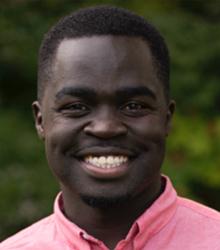Before joining the University of Oregon, Dr. James Muruthi was a Post-Doctoral Research Associate in the Human Development and Family Science department at Virginia Tech. His main research interest is on family and neighborhood factors, social capital, and health disparities among aging marginalized individuals. He has conducted studies using large public datasets (such as the HRS, NSOC, NHATS, and SAGE) and small independent data. James applies both advanced qualitative and quantitative methodologies in his research. He has conducted studies in Kenya, Ghana, South Africa, and the United States and published in various peer-reviewed journals, such as the Journal of Aging and Health. His current research interests involve leveraging social capital for better health among aging MSFWs, LGBTQ+, Black, and African older adults.
Post-doctoral Associate, Aug 2018 – May 2019
Human Development and Family Science
Center for Gerontology
Virginia Tech, Blacksburg, VA
PhD, May 2017
Human Development and Family Science
University of Georgia, Athens, GA
MS, May 2012
Gerontology
Miami University, Oxford, OH
BA, May 2010
Gerontology and Interdisciplinary Studies
Miami University, Oxford OH
To see his full list of publications, visit his [CV]
Professor Muruthi’s research interests are in health disparities among underserved aging minorities and their families. His specific areas of research include ways to leverage social capital to ensure healthy aging among these marginalized groups. His current research program combines health disparities and strength and coping frameworks to investigate mechanisms through which social capital directly/indirectly impacts health. With this focus, his research aims to inform the development and evaluation of community-informed frameworks and interventions for promoting health among aging minorities. Currently, his lines of research focus on: (1) promoting health communication among aging migrant seasonal farm workers; (2) understanding resilience and health among aging LGBTQ+ adults; (3) utilizing longitudinal data to enhance the understanding of non-communicable diseases in older Africans, and (4) investigating sociostructural determinants of health in aging Black individuals. He collaborates with local, national, and international colleagues in these research activities.

